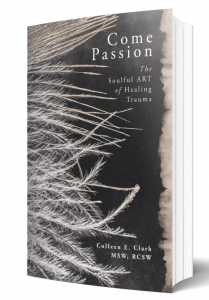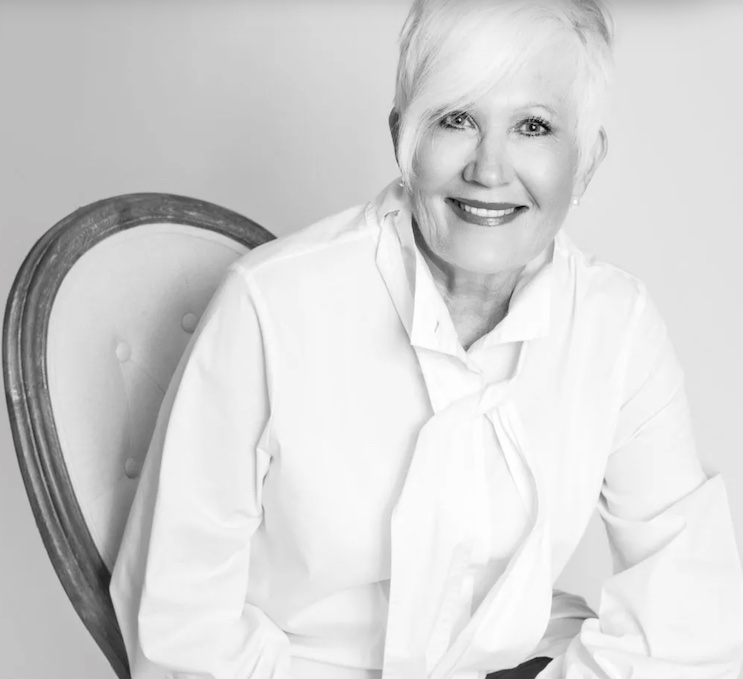When a focus is on trauma healing, where does a practitioner begin? Thousands of trained clinicians have become familiar with the efficacy of Accelerated Resolution Therapy (ART) in treating a myriad of mental health conditions caused by trauma. The question ART-trained practitioners most often ask is, “What do you do before ART?” Colleen Clark,RCSW Master ART Trainer and Practitioner answers this question in her new book, Come Passion: The Soulful ART of Healing Trauma. The book has been endorsed by ART founder Laney Rosenzweig, LMFT and Kevin Kip, Ph.D., who calls it “a must read for any clinician interested in seeking a brief yet highly effective approach for treatment of psychological trauma and related comorbidities.”
Colleen has educated more than 1,200 therapists from all over the globe as a Clinical ART Specialist, ACSW Clinical Supervisor, and diplomat with the American Academy of Experts in Traumatic Stress. In a seemingly serendipitous chain of events, Colleen began her journey with ART in 2014. She has since been a champion of the practice and was responsible for bringing ART to Canada. “Come Passion: The Soulful ART of Healing Trauma” guides the clinician on their own personal and spiritual journey in ART using intuition, preparation, and psychoeducation.
Her book provides guidelines, session breakdowns, and reflective questions at the end of each chapter to assist the clinician in evaluating their own path as a healer in their lives and the lives of clients, and “imagining” this application in the future of ART.
“Compassion and imagine had long been words which resonated for me. The more I heard the former, the more I said it, and the more I practiced it, it became: come, passion. With the latter word, imagine, John Lennon’s ideals and lyrics lapped waves against my soul, and connected with my passion. When we imagine, we evoke the visionary in one another. This is what I believe, but it is also what happened to me just before, during, and after the ART training”. p 33
Referring to the process of therapy as a “dance” between patient and practitioner, she explains how ART can give a profound structure to facilitate movement and possibility in treatment. When the appropriate checkpoints of safety and compassion are in place, the healing process can unfold uninhibited. For this reason, Colleen outlines how a practitioner must be familiar with ART as a trauma-informed modality according to SAMHA’S Six Key Principles Trauma-Informed Approach.
SAMHA’s Trauma-Informed Approach Involves:
- Understanding the different types of trauma, the themes of Type 1, Type 2, and Complex trauma.
- Being familiar with the signs and symptoms of trauma occurring in four categories: Intrusion, Avoidance, Negative changes in thoughts and mood, and chases in arousal and reactivity
- Examining cognitive distortions that may occur as a result of the trauma
- Understanding the parts of the brain most affected by trauma and how this translates into hyper/ hypo arousal
- Identifying attachment styles and developmental stages
- Practicing cultural competence: knowing what special population groups a client is a part of and how being part of this group may affect their trauma
- Creating stabilization before beginning
- Avoiding retraumatization
As trauma-informed therapy relies on predictability, Come Passion illustrates the need for psychoeducation before beginning ART to help patients better understand their diagnosis and situation. Enlightening your clients on how the process of ART focuses on alleviating the trauma will allow symptoms to shift and subside, influence increased participation and provide them with hope.
“When clients understand — from well explained examples — that their symptoms are a natural response to trauma, their shame is reduced, and they can see that they are much stronger than they are fragile. Your dialogue with clients can include, “It makes sense why you’d have these blocks, so we’re going to unblock them and then that will free up space. You might miss what filled up that space, yet it will be a new opportunity to put new things in that space. New thoughts, new behaviours, healthier ways.” p 138
Providing psychoeducation addresses:
- The commonality and normalcy of their symptoms
- An understanding that they have done the best they can in trying to protect themselves
- The symptoms they are experiencing are a result of trauma
- The process of ART and references to its success
- An understanding of the clear phases of trauma work
- Parts of the brain and their function in trauma
To develop a relationship of trust, imparting knowledge and education to clients is a crucial step before beginning. As trauma victims can often be skeptical and mistrusting based on past circumstances, creating a dependable, comforting, safe presence is necessary for starting your therapeutic connection with your client.
“Every therapist/client relationship is unique in that it is based on an individual story — regardless of the categorization of trauma or commonality of symptoms which have arisen from that trauma. Often, for clients, the relationship with you will be the first close relationship they will have had for a long time; perhaps the first in which they disclose their deepest feelings and expose their secrets. Even in ART, where there is not as much talking as other therapies, the story is still there.
While you provide a safe place for a client’s story, there will still be a fear of being judged or ridiculed. You are responsible to skillfully facilitate that safe place knowing that there can be an overwhelming urge for the client to cling to you as the only friend they’ve had, at least in the last while. There is an ideal space that you can provide which welcomes the client and does not cross the line of professionalism.” p 125
To create a positive relationship, a practitioner must fully understand a client’s background before beginning. This understanding gives guidance, information, and answers the question, “Who is my client?”
A consultation session lays out what will be addressed with a client.
Typically a consultation goes over:
- Paperwork filled out by a client or past healthcare providers
- How they feel about the process of beginning a new stage of treatment
- Themes, scenes, and stages of development
- Informed consent
- Specialized population groups and the types of trauma related to this
- Client’s beliefs and values
- Developmental genogram to understand family connections
The practitioner sets the stage in holding space for clients with unconditional positive regard. It is essential that a clinician practice such self-compassion in their own life. Come Passion delivers prompts to examine your life as a practitioner and encourage reflection on your life as a human being.
“Compassion is understanding that suffering is part of a shared experience. It is a great equalizer in understanding that perfection means imperfection. In being imperfectly you, you are perfect Have you ever sat with yourself and exercised self-compassion at or after times you perceive you’ve failed, messed up, didn’t understand, ran late, took on too much, became overwhelmed, broke down in tears, or second guessed your path in life?” p 110
As we take the time to understand our clients, their unique circumstances, and special interest groups, we must recognize that therapists and healers are also part of our own special interest group. Care, support, and understanding are required to maintain emotional balance. Come Passion: The Soulful ART of Healing Trauma invites practitioners to use this guide not only to “enhance your practice and skills as a trained ART therapist” but share your story as a contributor to the practice of ART and as a fellow healer.
Come Passion: The Soulful ART of Healing Trauma is now available. https://ingeniumbooks.com/colleen-clark/
Join Colleen for the official celebratory launch of Come Passion on June 9th,2023 in Calgary, Canada, or join online via ZOOM. Email Kimberley.raynor@icloud.ca to attend.
 Colleen offers Master ART training in Canada https://colleeneclarkconsulting.com/art-training/ and is available for consultations and speaking engagements. Visit her site at https://colleeneclarkconsulting.com/.
Colleen offers Master ART training in Canada https://colleeneclarkconsulting.com/art-training/ and is available for consultations and speaking engagements. Visit her site at https://colleeneclarkconsulting.com/.
Additional Sources
https://www.cdc.gov/orr/infographics/6_principles_trauma_info.htm

